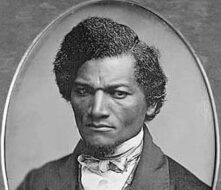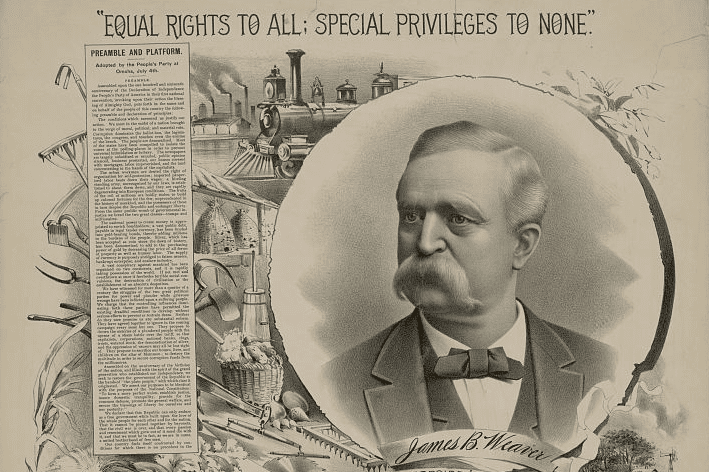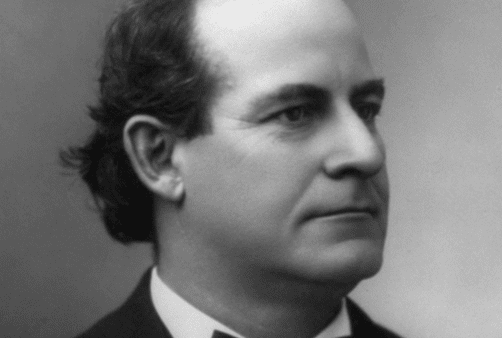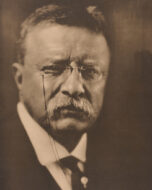
Introduction
As a member and eventual vice president of the National Women’s Suffrage Association, Jane Addams (1860–1935) often spoke and wrote in favor of granting women the right to vote. The piece included here, “Why Women Should Vote,” is noteworthy for several reasons. Note that, as a column in Ladies’ Home Journal, its primary audience was women. Addams’ argument is not merely that women should be permitted to vote, but that they increasingly have a duty to vote, especially in light of modern familial, political, and economic circumstances. It had become increasingly clear, she argued, that women need the vote in order to fulfill even traditional roles in the home and family. Her argument was a practical one rather than the abstract, rights-based argument one might encounter elsewhere (see, for example, the Seneca Falls Declaration of 1848).
Source: Jane Addams, “Why Women Should Vote,” Ladies’ Home Journal (January 1910): 21–22, available online at the Jane Addams Papers Project (digital edition), Ramapo College of New Jersey: https://digital.janeaddams.ramapo.edu/items/show/6155.
For many generations it has been believed that woman’s place is within the walls of her own home, and it is indeed impossible to imagine the time when her duty there shall be ended or to forecast any social change which shall release her from that paramount obligation.
This paper is an attempt to show that many women today are failing to discharge their duties to their own households properly simply because they do not perceive that as society grows more complicated it is necessary that woman shall extend her sense of responsibility to many things outside of her own home if she would continue to preserve the home in its entirety. One could illustrate in many ways. A woman’s simplest duty, one would say, is to keep her house clean and wholesome and to feed her children properly. Yet if she lives in a tenement house, as so many of my neighbors do, she cannot fulfill these simple obligations by her own efforts because she is utterly dependent upon the city administration for the conditions which render decent living possible. Her basement will not be dry, her stairways will not be fireproof, her house will not be provided with sufficient windows to give light and air, nor will it be equipped with sanitary plumbing, unless the Public Works Department sends inspectors who constantly insist that these elementary decencies be provided. Women who live in the country sweep their own dooryards and may either feed the refuse of the table to a flock of chickens or allow it innocently to decay in the open air and sunshine. In a crowded quarter, however, if the street is not cleaned by the city authorities no amount of private sweeping will keep the tenement free from grime; if the garbage is not properly collected and destroyed a tenement-house mother may see her children sicken and die of diseases from which she alone is powerless to shield them, although her tenderness and devotion are unbounded. She cannot even secure untainted meat for her household, she cannot provide fresh fruit, unless the meat has been inspected by city officials, and the decayed fruit, which is so often placed upon sale in the tenement districts, has been destroyed in the interests of public health. In short, if woman would keep on with her old business of caring for her house and rearing her children she will have to have some conscience in regard to public affairs lying quite outside of her immediate household. The individual conscience and devotion are no longer effective.
Chicago one spring had a spreading contagion of scarlet fever just at the time that the school nurses had been discontinued because businessmen had pronounced them too expensive. If the women who sent their children to the schools had been sufficiently public-spirited and had been provided with an implement through which to express that public spirit they would have insisted that the schools be supplied with nurses in order that their own children might be protected from contagion. In other words, if women would effectively continue their old avocations they must take part in the slow upbuilding of that code of legislation which is alone sufficient to protect the home from the dangers incident to modern life. . . .
If women follow only the lines of their traditional activities here are certain primary duties which belong to even the most conservative women, and which no one woman or group of women can adequately discharge unless they join the more general movements looking toward social amelioration through legal enactment.
The first of these, of which this article has already treated, is woman’s responsibility for the members of her own household that they may be properly fed and clothed and surrounded by hygienic conditions. The second is a responsibility for the education of children: (a) that they may be provided with good schools; (b) that they may be kept free from vicious influences on the street; (c) that when working they may be protected by adequate child-labor legislation.
(a) The duty of a woman toward the schools which her children attend is so obvious that it is not necessary to dwell upon it. But even this simple obligation cannot be effectively carried out without some form of social organization as the mothers’ school clubs and mothers’ congresses testify, and to which the most conservative women belong because they feel the need of wider reading and discussion concerning the many problems of childhood. It is, therefore, perhaps natural that the public should have been more willing to accord a vote to women in school matters than in any other, and yet women have never been members of a Board of Education in sufficient numbers to influence largely actual school curriculi. If they had been, kindergartens, domestic science courses, and school playgrounds would be far more numerous than they are. More than one woman has been convinced of the need of the ballot by the futility of her efforts in persuading a businessman that young children need nurture in something besides the three r’s. Perhaps, too, only women realize the influence which the school might exert upon the home if a proper adaptation to actual needs were considered. . . .
(b) But women are also beginning to realize that children need attention outside of school hours; that much of the petty vice in cities is merely the love of pleasure gone wrong, the overstrained boy or girl seeking improper recreation and excitement. It is obvious that a little study of the needs of children, a sympathetic understanding of the conditions under which they go astray, might save hundreds of them. Women traditionally have had an opportunity to observe the plays of children and the needs of youth, and yet in Chicago, at least, they had done singularly little in this vexed problem of juvenile delinquency until they helped to inaugurate the Juvenile Court movement a dozen years ago. The Juvenile Court Committee, made up largely of women, paid the salaries of the probation officers connected with the court for the first six years of its existence, and after the salaries were cared for by the county the same organization turned itself into a Juvenile Protective League, and through a score of paid officers are doing valiant service in minimizing some of the dangers of city life which boys and girls encounter. . . .
. . . Because this body of women assumed a public responsibility they have seen to it that every series of pictures displayed in the five-cent theater is subjected to a careful censorship before it is produced, and those series suggesting obscenity and criminality have been practically eliminated. The Police Department has performed this and many other duties to which it was oblivious before simply because these women have made it realize that it is necessary to protect and purify those places of amusement which are crowded with young people every night. This is but the negative side of the policy pursued by the public authorities in the fifteen small parks of Chicago, each of which is provided with halls in which young people may meet nightly for social gatherings and dances. The more extensively the modern city endeavors on the one hand to control and on the other hand to provide recreational facilities for its young people the more necessary it is that women should assist in their direction and extension. After all, a care for wholesome and innocent amusement is what women have for many years assumed. When the reaction comes on the part of taxpayers, women’s votes may be necessary to keep the city to its beneficent obligations toward its own young people.
(c) As the education of her children has been more and more transferred to the school, so that even children four years old go to the kindergarten, the woman has been left in a household of constantly narrowing interests, not only because the children are away but also because one industry after another is slipping from the household into the factory. Ever since steam power has been applied to the processes of weaving and spinning woman’s traditional work has been carried on largely outside of the home. The clothing and household linen are not only spun and woven, but also usually sewed by machinery; the preparation of many foods has also passed into the factory and necessarily a certain number of women have been obliged to follow their work there, although it is doubtful, in spite of the large number of factory girls, whether women now are doing as large a proportion of the world’s work as they used to do. Because many thousands of those working in factories and shops are girls between the ages of fourteen and twenty-two there is a necessity that older women should be interested in the conditions of industry. The very fact that these girls are not going to remain in industry permanently makes it more important that someone should see to it that they shall not be incapacitated for their future family life because they work for exhausting hours and under insanitary conditions.
If woman’s sense of obligation had enlarged as the industrial conditions changed she might naturally and almost imperceptibly have inaugurated the movements for social amelioration in the line of factory legislation and shop sanitation. That she has not done so is doubtless due to the fact that her conscience is slow to recognize any obligation outside of her own family circle, and because she was so absorbed in her own household that she failed to see what the conditions outside actually were. It would be interesting to know how far the consciousness that she had no vote and could not change matters operated in this direction. After all, we see only those things to which our attention has been drawn, we feel responsibility for those things which are brought to us as matters of responsibility. If conscientious women were convinced that it was a civic duty to be informed in regard to these grave industrial affairs, and then to express the conclusions which they had reached by depositing a piece of paper in a ballot box, one cannot imagine that they would shirk simply because the action ran counter to old traditions. . . .
. . . Public-spirited women who wish to use the ballot, as I know them, do not wish to do the work of men nor to take over men’s affairs. They simply want an opportunity to do their own work and to take care of those affairs which naturally and historically belong to women, but which are constantly being overlooked and slighted in our political institutions.
In a complex community like the modern city all points of view need to be represented; the resultants of diverse experiences need to be pooled if the community would make for sane and balanced progress. If it would meet fairly each problem as it arises, whether it be connected with a freight tunnel having to do largely with businessmen, or with the increasing death rate among children under five years of age, a problem in which women are vitally concerned, or with the question of more adequate streetcar transfers, in which both men and women might be said to be equally interested, it must not ignore the judgments of its entire adult population.
To turn the administration of our civic affairs wholly over to men may mean that the American city will continue to push forward in its commercial and industrial development, and continue to lag behind in those things which make a city healthful and beautiful. After all, woman’s traditional function has been to make her dwelling-place both clean and fair. Is that dreariness in city life, that lack of domesticity which the humblest farm dwelling presents, due to a withdrawal of one of the naturally cooperating forces? If women have in any sense been responsible for the gentler side of life which softens and blurs some of its harsher conditions, may they not have a duty to perform in our American cities?
In closing, may I recapitulate that if woman would fulfill her traditional responsibility to her own children; if she would educate and protect from danger factory children who must find their recreation on the street; if she would bring the cultural forces to bear upon our materialistic civilization; and if she would do it all with the dignity and directness fitting one who carries on her immemorial duties, then she must bring herself to the use of the ballot—that latest implement for self-government. May we not fairly say that American women need this implement in order to preserve the home?
The New Nationalism
August 31, 1910
Conversation-based seminars for collegial PD, one-day and multi-day seminars, graduate credit seminars (MA degree), online and in-person.


































































































